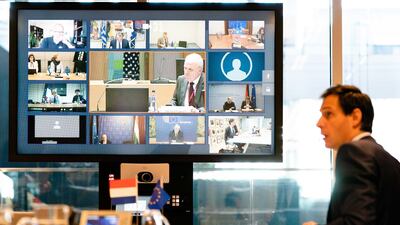EU finance ministers have met via video link to discuss their economic response to the coronavirus in what has been as described the bloc’s “biggest test” to date.
Member nations have looked to heal a dangerous rift between northern and southern states over the stimulus package to address the Covid-19 pandemic.
Nine EU nations including France, Italy and Spain have asked fellow member states to mitigate the financial hardship from the public health emergency using what have become known as coronabonds.
However, politicians in the north, led by Germany, Austria and the Netherlands, have blocked the plans. The more fiscally conservative northern nations fear the measures could mean their taxpayers end up footing the bill for southern debt.
As she pushed back against the idea of coronabonds on Monday, German Chancellor Angela Merkel said the EU faced it’s “biggest test” to date over the stimulus plans.
"Europe, the EU, is facing its biggest test since its foundation," she said at a press conference. "Everyone is equally affected so it must be in everyone's interest ... that Europe should emerge strongly from this test.”
"Germany is only doing well if Europe is doing well," she added.
Ms Merkel’s government has said repeatedly that it would support the activation of the European Stability Mechanism bailout fund to help those nations worst hit by the virus.
Following preparatory meetings on Monday, European Council President Charles Michel implied solutions could be found within existing frameworks, strongly indicating backing for activating the bailout fund.
“There is a lot of room for solidarity within the existing instruments and institutions. We have to exploit these tools fully and remain open to doing more. A strong package is in the making,” he said.
It also appears that the door to further discussions on new measures like coronabonds will remain open.
Consensus appeared to be mounting around the use of the stability mechanism following an EU leaders virtual summit at the end of March.
At the same meeting, Italy, the country the worst hit by the coronavirus crisis, voiced concerns over conditions attached to financial assistance from the EU.
Speaking prior to Tuesday’s meeting, the EU commissioner for economics Paolo Gentiloni tweeted that responsibility and ambition was required from the Eurogroup. “In the face of the most serious crisis since the war, it is time for European countries to take another step forward in their common response,” he wrote.
In the build up to the meeting, the EU gave the green-light to various stimulus packages created by national governments to respond to the economic consequences of the coronavirus. Under normal circumstances the vast sums of money used to prop up businesses would be in breach of EU competition rules.















